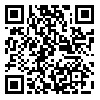Introduction: The previllage of metacognitive knowledge enables the learner's to involve in every moment of their learning activities and the points for which their work progresses and identifies strengths and weaknesses. At the present, the majaroty of academic failures occure on learners because they attempt to learn through inefficient methods. This study aimed to investigate the relationship between test anxieties with metacognitive strategies.
Methods: The research design of this study was Canonical Correlation. The sample of this study included 39 health professional students who were selected by census method using Cochran formula. Metacognitive reading strategies and test anxiety questionnaires were completed by students. In this study, data were analyzed by software SPSS 20 and Pearson correlation where canonical analysis was used.
Results:The data indicate three sets of canonical correlation dimension, metacognitive reading strategies are significantly correlated with test anxiety (The relationship of the second set 0.57, P<0.001; the relationship of the second set 0.43, P<0.001; and the relationship of the third set 0.09, P<0.004). These results indicate that students who use cognitive learning strategies experience less test anxiety.
Conclusion: Using metacognitive strategies by students can be influenced by test anxiety and in many cases they prevent test anxiety leading to the progress and academic success.
Received: 2016/03/11 | Accepted: 2016/08/9 | Published: 2016/10/3
| Rights and permissions | |
 |
This work is licensed under a Creative Commons Attribution-NonCommercial 4.0 International License. |


